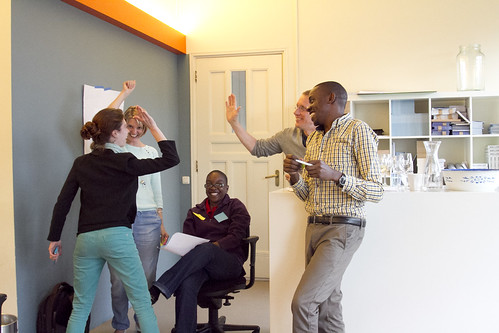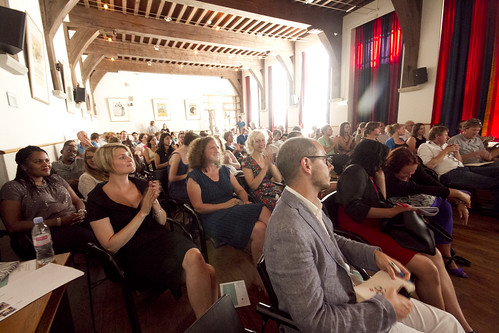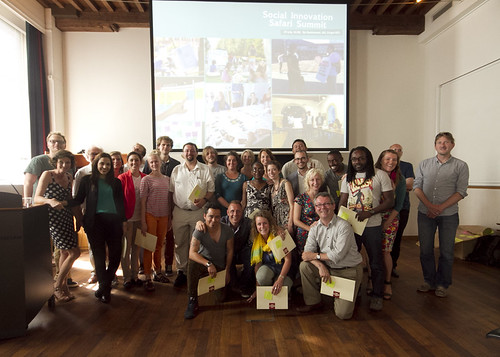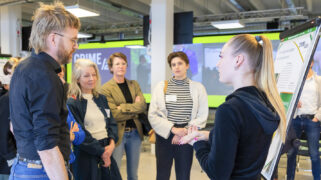Social Safari 2013 Wrap-up
During 10 days, 23 participants, from more than 10 different countries went on Social Safari in Amsterdam. In the midst of the urban jungle participants set out to find new social solutions for some of the most wicked challenges in our city such as youth unemployment, youth care for young criminal offenders, a declining urban neighbourhood and the rise of a shared economy.
- Betrokken KL'ers
- Chris Sigaloff
- Thijs van Exel
- Nora van der Linden
During 10 days, 23 participants, from more than 10 different countries such as Kenya, Costa Rica, Iran, Zimbabwe, Guatemala and Nicaragua, went on Social Safari in Amsterdam. In the midst of the urban jungle participants set out to find new social solutions for some of the most wicked challenges in our city such as youth unemployment, youth care for young criminal offenders, a declining urban neighbourhood and the rise of a shared economy.
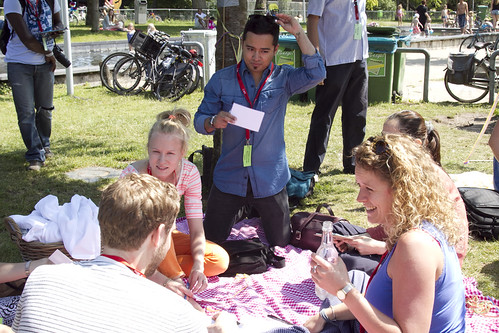
Old problems, new insights, new partnerships
All around the world we are facing some pretty tough social and economic challenges – from climate change to unemployment, from chronic diseases to growing income inequality. And although the nature and severity of these problems differ, they all are in need of fresh approaches and out of the system solutions. The same old approaches, same old frameworks and same old ideologies are falling short. The aim of the Social Safari is to discover new ways of thinking and doing and to give space to try them out for real. For this reason three organisations came together: Kennisland, a think tank for societal renewal, University of Amsterdam’s graduate school for social studies and Hivos, a development organisation supporting social innovation around the world. Together we selected a talented and inspiring bunch of social innovators from around the world and developed a learning experience based on their knowledge and experience in creating social change. The result was an intense and immersive pressure cooker filled with tough questions, short time frames, tons of activities, fresh theories and methods and of course loads of group dynamics!
The Safari journey: upside down and backwards up
The group started its expedition by visiting the four sponsor organisations where it was introduced to the social challenges. They visited the office of the Amsterdam Economic Affairs, the department of Work and Income, the Bureau of Youth Care and the community center of the Housing Cooperation De Alliantie in the Dobbe neighbourhood. After that four groups were formed, each focussing on one of the challenges.
Although the groups started investigating the social issue from the perspective of the system, they quickly shifted the focus to the world of the end users. In order to understand this world the participants observed the power of ethnographic methods taught by Sarah Schulman. This led to a reframing of the original problem statements and to the generation of fresh approaches and ideas of which some got to be prototyped in real life. The assumption is that in order to really get to new approaches one needs to start by questioning the underlying values on which the problems are based. Is it really the government’s responsibility to keep children safe and what does ‘safe’ actually mean in the life of a child? Should all young unemployed people be geared towards work? Should new expressions of the shared economy become part of the formal system? And what do the inhabitants consider to be a ‘good’ neighbourhood and how does this differ from the view of the housing cooperation?
Future proof solutions rely in many instances on a more user driven perspective instead of adhering to institutional driven objectives. A shift that most institutions recognise, but find very hard to realise.
Outcomes: big ambitions, small steps
- Team Dobbe neighbourhood: ‘Dobbe hood culture’
By spending a lot of time on the streets of the Dobbe neighbourhood the team found out that there is actually a lot going on in the neighbourhood of which the housing cooperation has no knowledge. What the inhabitants perceive to be a likable community is often not recognised by the system. For this reason the team experimented with activities in order to create the Dobbe ’hood’ culture; a set of familiar daily activities which can lead to new fruitful ways for community engagement. A mail idea and a bike service were prototyped: familiar services that are trustworthy, stimulate new forms of interaction and can serve as fresh entry points for the Alliantie to communicate with its residents.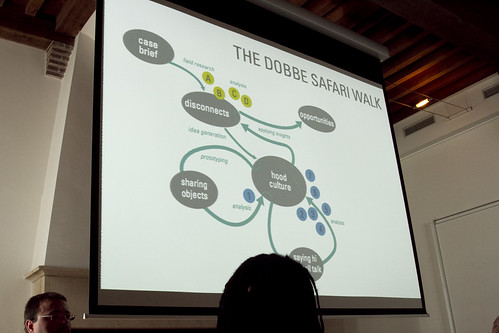
- Team DWI: ‘Kraftwerk’ Team
DWI (department of work and income) worked on the issue of youth unemployment in Amsterdam. From DWI’s perspective, the problem is centred around a large group of youth who are not reached. The estimation is that over five thousand unemployed young people could benefit from existing services but do not. After talking to organisations involved and to young unemployed themselves, they reframed the problem. Rather than putting DWI in the middle, the more fruitful question is: ‘how could unemployed youngsters better get their needs fulfilled in finding work?’ This set the stage for a more youth centred approach. Although if was difficult in such a short time frame to really come in contact with unemployed youngsters the group came up with an approach of a government service that is friendly, open, non-bureaucratic and, most importantly, functions as a support system for individual ideas and ambitions instead of a ‘control system’ which ensures the young unemployed to adhere to its policies. Coining it Kraftwerk, the group prototyped this ‘ideal government’ idea with a group of youngsters, government policy makers, and a start-up accelerator. What came out was an enriched ideal government service, complete with a set of entry points through which youth could access it. Hopefully this led to some fruitful hunches that DWI can further investigate during their own Safari, which will take place after the summer.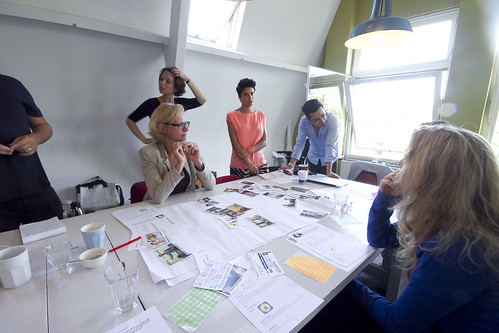
- Team Youthcare: One size does not fit all!
In 2011 the Amsterdam bureau of Youth Care developed a new family-led approach. Although it is conceived as very successful the bureau asked the Safari team to investigate possible blind spots. After working with the family workers and with some children it became apparent that some children are left out from the system due to the fact that they are ‘unmotivated’, ‘alone’ or have a ‘low IQ’. The family-led approach works in some cases but not for all. Although the family workers recognise that some children are not reached, they have alternative instrumentation at hand. So the safari team started cooking up possible new ideas for how to deliver support to children who now fall out of the system. Some of which were radical (such as a peer-to-peer community) and some that could be easily introduced within the existing Youth Care system. By prototyping a new diverse set of tools and interactions a first orientation is made on how Youth Care can reach more children using alternative approaches.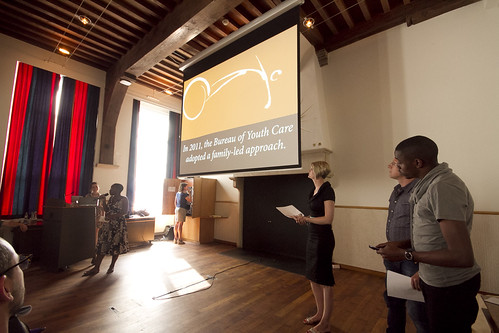
- Team Shared Economy: Amsterdam Sharing Capital of the World
The world is changing. Where for decades people aimed to own a house, a car and a powerdrill, nowadays people tend to share more. In Amsterdam, many online platforms have come up that allow people to easily connect to andshare a car (through MyWheels, Greenwheels, ConnectCar, Snappcar), rent an apartment (Airbnb), or provide a couch (couchsurfing), share equipment (Peerby) or buy a homemade meal from a neighbor (Thuisafgehaald). Trust, sharing and enhancing social cohesion are gaining importance in the world of ‘collaborative consumption’.The Economic Affairs department of the city of Amsterdam asked us to look into the possibilities of these new developments. Although the trend of sharing may pose challenges to institutions such as the Economic Affairs department (for example related to tax issues), the way the question was phrased was based on the assumption that people do indeed benefit and that the sharing economy provides opportunities. The group working on this case decided to disect the question and study a more open question that lies below: who does and doesn’t benefit from the sharing economy in Amsterdam? Based on our research, personas were created representing different category groups we spoke to.
Based on the analysis and the fact that Amsterdam has always been a frontrunner, the group launched the campaign ‘Amsterdam, Sharing capital of the world’. Under this umbrella an array of ideas came up, of which several were prototyped and tested: an online platform bringing together the different sharing websites, for both locals and tourists; a day in the life of a sharer, showing how through sharing all basic necesities can be provided; a sharing broker, helping the less digitally connected to find their way online; a link to social initiatives in the city, such as Stadspas and finally a game for policymakers and the local government level to spark debate about the topic of the sharing economy.
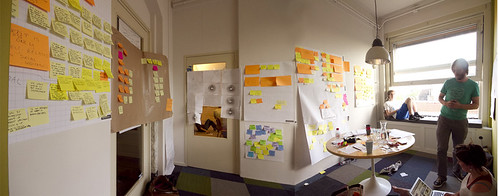
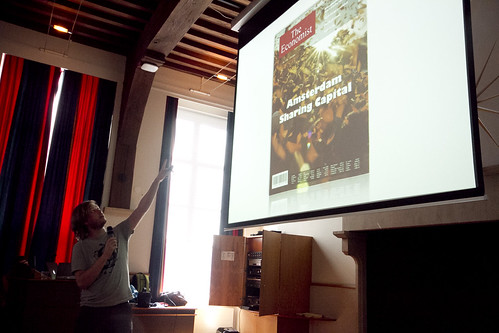
Further steps
Although it was an inspiring and intense journey, in order to achieve real lasting change it was of course still too short. New approaches to social change have been investigated, hunches which could be the basis of new solutions have been developed and prototyped, new connections have been made, but more remains to be done to really create new fruitful perspectives for the big social problems of our time. Safari 2013 was an invigorating first step. Thank you all for joining this adventure. It is only by getting out there and actually doing things differently that we can create new perspectives for a more social and sustainable future.
- Betrokken KL'ers
- Chris Sigaloff cs@kl.nl
- Thijs van Exel te@kl.nl
- Nora van der Linden nl@kl.nl

